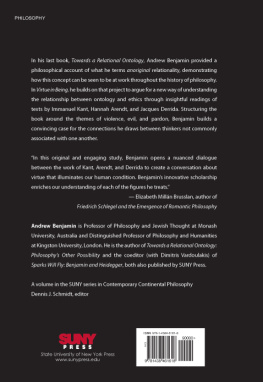Virtue Ethics
This volume provides a clear and accessible overview of central concepts, positions, and arguments in virtue ethics today. While it focuses primarily on Aristotelian virtue ethics, it also includes discussion of alternative forms of virtue ethics (sentimentalism and pluralism) and competing normative theories (consequentialism and deontology).
The first six chapters are organized around central questions in normative ethics that are of particular concern to virtue ethicists and their critics:
What is virtue ethics?
What makes a trait a virtue?
Is there a link between virtue and happiness?
What is involved in being well-motivated?
What is practical wisdom?
What makes an action right?
The last four chapters focus on important challenges or objections to virtue ethics:
Can virtue ethics be applied to particular moral problems?
Does virtue ethics ultimately rely on moral principles?
Can it withstand the situationist critique?
What are the prospects for an environmental virtue ethics?
Liezl van Zyl is Senior Lecturer in Philosophy at the University of Waikato, New Zealand. She works primarily in ethics, in particular virtue ethics and applied ethics.
ROUTLEDGE CONTEMPORARY INTRODUCTIONS TO PHILOSOPHY
Series editor
Paul K. Moser
Loyola University of Chicago
This innovative, well-structured series is for students who have already done an introductory course in philosophy. Each book introduces a core general subject in contemporary philosophy and offers students an accessible but substantial transition from introductory to higher-level college work in that subject. The series is accessible to non-specialists and each book clearly motivates and expounds the problems and positions introduced. An orientating chapter briefly introduces its topic and reminds readers of any crucial material they need to have retained from a typical introductory course. Considerable attention is given to explaining the central philosophical problems of a subject and the main competing solutions and arguments for those solutions. The primary aim is to educate students in the main problems, positions and arguments of contemporary philosophy rather than to convince students of a single position.
Recently Published Volumes:
Metaphysics
4th Edition
Michael J. Loux and Thomas M. Crisp
Social and Political Philosophy
2nd Edition
John Christman
Ethics
3rd Edition
Harry J. Gensler
Virtue Ethics
Liezl van Zyl
For a full list of published Routledge Handbooks in Philosophy, please visit https://www.routledge.com/Routledge-Contemporary-Introductions-to-Philosophy/book-series/SE0111
Virtue Ethics
A Contemporary Introduction
Liezl van Zyl

First published 2019
by Routledge
711 Third Avenue, New York, NY 10017
and by Routledge
2 Park Square, Milton Park, Abingdon, Oxon OX14 4RN
Routledge is an imprint of the Taylor & Francis Group, an informa business
2019 Taylor & Francis
The right of Liezl van Zyl to be identified as author of this work has been asserted by her in accordance with sections 77 and 78 of the Copyright, Designs and Patents Act 1988.
All rights reserved. No part of this book may be reprinted or reproduced or utilized in any form or by any electronic, mechanical, or other means, now known or hereafter invented, including photocopying and recording, or in any information storage or retrieval system, without permission in writing from the publishers.
Trademark notice: Product or corporate names may be trademarks or registered trademarks, and are used only for identification and explanation without intent to infringe.
Library of Congress Cataloging in Publication Data
A catalog record for this title has been requested
ISBN: 978-0-415-83617-3 (hbk)
ISBN: 978-0-415-83616-6 (pbk)
ISBN: 978-0-203-36196-2 (ebk)
I first became interested in the virtues as a graduate student in the 1990s, while writing a thesis on end-of-life decision-making. I was puzzled to find that although terms such as compassion, mercy, and kindness featured prominently in the public discourse about the morality of euthanasia and physician-assisted suicide, debates in bioethics proceeded almost exclusively in terms of moral rules and principles. The dominant view, even among ethicists who thought the virtues were important, was that virtue ethics cannot stand on its own as a complete normative theory, and that the virtues needed to be supplemented with a set of rules or principles. Roughly, the general consensus was that it would of course be wonderful for medical professionals to be more compassionate and caring, but that their first priority must be to fulfill their duties to patients. Accordingly, a particular act of euthanasia could well be compassionate but wrong because it violates the duty not to kill an innocent person.
Since then, leading figures in the field, including Philippa Foot, Julia Annas, Rosalind Hursthouse, Christine Swanton, and Michael Slote, have shown that virtue ethics should be taken seriously as an alternative to deontology and consequentialism. Over the last two or three decades the literature on virtue ethics has grown substantially. This is most obvious in the fields of normative and applied ethics, but the interest in the virtues has also spread to other areas, such as metaethics, epistemology, philosophy of education, philosophy of psychology, and theology. The inevitable result is that newcomers encounter significant difficulty in deciding what to read and where to start. Much of the literature is inaccessible, usually because the author presupposes a familiarity with key concepts and debates.
The aim of this book is to introduce readers to central concepts and questions in contemporary virtue ethics. I focus on Aristotelian virtue ethics, given that it is by far the most popular version, but I pay a fair amount of attention to alternative versions of virtue ethics (sentimentalism and pluralism), as well as two rival normative theories (consequentialism and deontology), in particular their accounts of virtue and their objections to virtue ethics. Given limitations of space as well as expertise, I had to leave out a number of important and interesting questions and developments. Of particular note in this regard is the growing interest in Eastern philosophies in which virtue plays an important role, such as Buddhism, Confucianism, and Hinduism. Other research areas that deserve mention focus on questions about the role of virtue in moral education, the nature and possibility of moral self-cultivation, the role of virtue in political philosophy, and the merits of Aristotelian naturalism. It is my hope that the book will help prepare readers to explore these areas on their own.
I would like to thank people who gave feedback on the initial book proposal or parts of the manuscript. These include Mark Alfano, Rosalind Hursthouse, Jason Kawall, Kerry Lockhart, Nick Smith, Joe Ulatowski, and Ruth Walker, as well as a few very generous (and one or two not so generous) anonymous reviewers. Kerry Lockhart deserves a special thank you, as he gave useful feedback on each chapter (more than once) and helped prepare the final version of the manuscript. I am grateful to the Faculty of Arts and Social Sciences at the University of Waikato, New Zealand, for financial assistance, and to my editor, Andrew Beck, for his ongoing support and patience.













